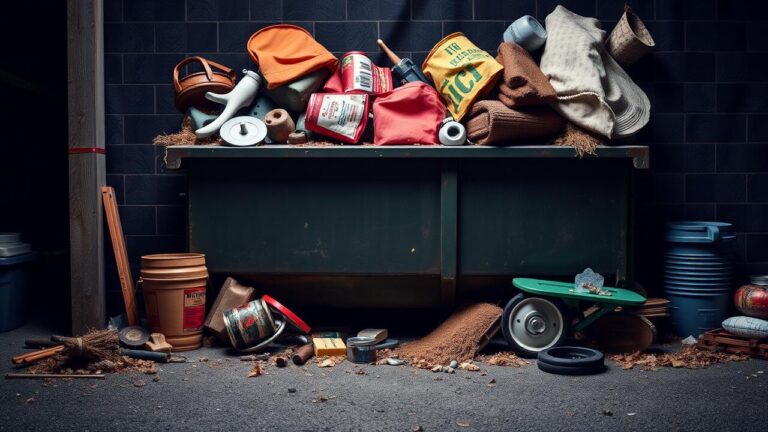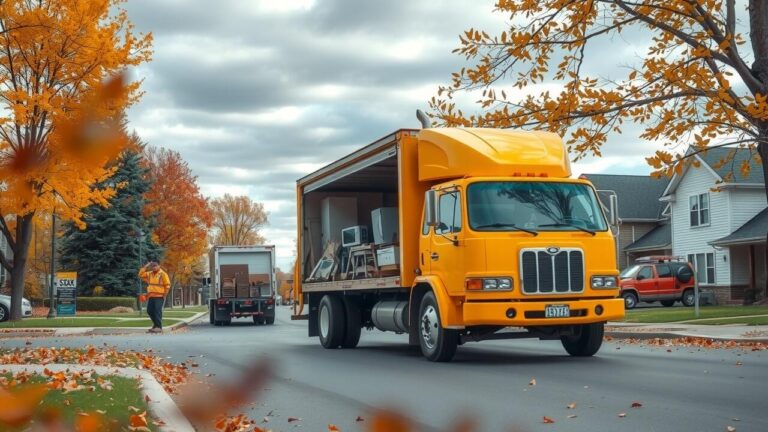What is a Residential Dumpster?
Cost Factors for Renting a Residential Dumpster
Renting a residential dumpster involves multiple cost factors that can influence the final price. The size of the dumpster plays a crucial role, with larger sizes typically commanding higher rental fees. Additionally, the duration of the rental affects costs; longer rental periods can lead to increased charges. Location also impacts pricing, as disposal fees and market demand vary by region, often requiring renters to consider local rates.
Other expenses may arise based on the type of materials being disposed of, especially if hazardous waste is involved, which often incurs additional fees. Delivery and pickup charges can also add to the overall cost, particularly if the service provider needs to travel a significant distance. It is essential for renters to understand these factors to budget effectively for their residential dumpster needs.
Pricing Variables
When considering the cost of renting a residential dumpster, several factors come into play. The size of the dumpster is a primary variable, as larger containers tend to cost more due to increased capacity. The rental duration also impacts pricing, with longer rentals generally incurring higher fees. Geographic location carries weight, too, as prices can vary by region or city based on local demand and competition among rental companies.
Type of waste affects cost as well, particularly if hazardous materials are involved. Some companies may charge extra fees for specific items, such as electronics or certain chemicals. Additional services, such as same-day delivery or pick-up, can also increase the final bill. Understanding these pricing variables helps individuals better budget for their waste removal needs while ensuring compliance with local regulations.
The Rental Process for Residential Dumpsters
Renting a residential dumpster typically begins with determining the type and size required for the specific job. Assessing the volume of debris or waste is crucial in making the right choice. Many companies offer various sizes, ranging from small units for home cleanouts to larger containers for renovation projects. Additionally, homeowners should consider the rental duration, as prices can vary based on the length of time the dumpster is needed.
Once a suitable dumpster is selected, the next step involves contacting a rental service to schedule delivery. Most companies require information about the location where the dumpster will be placed and any possible restrictions in the area, such as street permits or property access. Clear communication regarding the rental terms, including pricing, deposit, and waste disposal rules, ensures a smooth process. Customers can expect the dumpster to be delivered according to the agreed schedule, ready for use.
Steps to Rent
Renting a residential dumpster begins with assessing your specific needs. Determine the type of waste you need to dispose of and the amount of space required. Different projects may require different sizes and types of dumpsters. Once you have a clear understanding of your requirements, research local rental companies to compare pricing and services offered.
After selecting a provider, the next step involves contacting them to check availability. Provide details about your project including the expected rental duration and the weight of waste anticipated. The company will guide you through their rental agreements and any specific regulations related to the disposal of certain materials. Ensure you clarify any questions regarding delivery, pickup, and payment terms before finalizing the rental.
Proper Usage of Residential Dumpsters
Maximizing the efficiency of a residential dumpster requires mindful loading techniques. Distributing weight evenly across the container ensures stability during transport. Placing heavier items at the bottom helps avoid shifting, while lighter materials can fill the gaps on top. This method improves accessibility for waste collection and optimizes the available space, allowing for more waste to be disposed of effectively.
Being aware of local regulations is also vital when utilizing a dumpster. Different municipalities may have specific rules regarding what can and cannot be placed inside. Hazardous materials such as chemicals, tires, and electronics often require special disposal methods. Familiarizing yourself with these regulations will prevent potential fines and ensure compliance with waste management guidelines.
Tips for Effective Loading
Loading a residential dumpster efficiently can save you both time and money. Start by breaking down large items to maximize space. Stack materials securely, placing heavier items at the bottom. This not only keeps the load balanced but also prevents damage to the contents. Additionally, try to fill in gaps between items with smaller debris, which helps to utilize the entire volume of the dumpster.
Consider the weight limits outlined by the rental company. Overloading can lead to extra charges and complications during pickup. It is also important to avoid putting prohibited items inside the dumpster. Familiarize yourself with the list of acceptable materials beforehand. Proper loading techniques ensure compliance with regulations and make the waste disposal process smoother overall.
Common Mistakes to Avoid
When renting a residential dumpster, failing to understand the restrictions on what can and cannot be disposed of is a common pitfall. Items like hazardous materials, electronics, or large appliances often cannot be included in the rental. Overlooking these guidelines can lead to unexpected charges or fines. It’s essential to verify with the rental company about specific limitations to ensure compliance and prevent additional costs.
Another mistake is underestimating the needed dumpster size. Many people choose a smaller container to save money, only to realize it’s insufficient for their project. This can result in extra trips or additional rentals, negating any initial savings. Accurately assessing the volume of waste beforehand will help in selecting the appropriate size and avoiding last-minute complications.
Missteps in Dumpster Rental
Many individuals underestimate the importance of understanding size requirements when renting a dumpster. Choosing a container that is too small often leads to overstuffing, creating safety hazards and potential extra fees for excess weight. Conversely, selecting a dumpster that is significantly larger than necessary may result in unnecessary rental costs. Accurate assessment of project needs is critical to avoid these pitfalls.
Another common error is neglecting to verify what materials can be disposed of in the dumpster. Certain items like hazardous waste, electronics, and construction debris typically have specific regulations that vary by location. Failing to adhere to these guidelines can result in fines or additional charges. Proper research and clear communication with the rental company help in ensuring compliance and avoiding unwanted complications.
FAQS
What is a residential dumpster?
A residential dumpster is a large container provided for the purpose of collecting waste and debris from home renovation projects, cleanouts, or other residential needs. These dumpsters are typically rented for a short period and are designed to handle various types of waste, including construction materials, yard waste, and household junk.
How much does it cost to rent a residential dumpster?
The cost of renting a residential dumpster can vary based on several factors, including the size of the dumpster, the rental duration, the type of waste being disposed of, and any additional fees for delivery or pickup. It’s best to obtain quotes from local rental companies for accurate pricing.
What are the steps to rent a residential dumpster?
To rent a residential dumpster, first determine the size you need based on the amount of waste you have. Next, contact a rental company to check availability and pricing. After agreeing on terms, schedule a delivery date, and ensure you have a suitable location for the dumpster on your property.
Are there restrictions on what can be placed in a residential dumpster?
Yes, there are restrictions on what can be placed in residential dumpsters. Common prohibited items include hazardous materials (such as paint or chemicals), electronics, tires, and appliances. Always check with your rental company for a complete list of acceptable and unacceptable items.
What are some common mistakes to avoid when renting a residential dumpster?
Common mistakes include underestimating the size of the dumpster needed, not checking the rental agreement for hidden fees, overlooking local regulations regarding dumpster placement, and failing to properly load the dumpster to maximize space. Being aware of these pitfalls can lead to a smoother rental experience.







